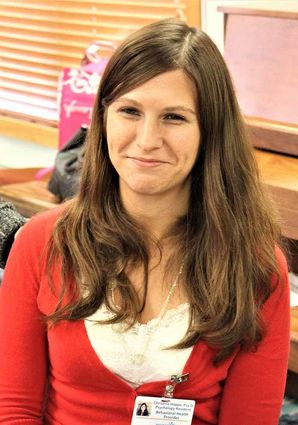Christina Hoppe, new Behavioral Health Provider spoke to Cancer Support Group
August 29, 2018
Chinook's Cancer Support Group's August gathering featured a presentation on sleep by Sweet Medical Center's (SMC) newest Behavioral Health Provider, Christina Hoppe. Hoppe, a native of Havre and a 2007 graduate of Havre High, completed her PsyD (Doctor of Psychology) in 2016 from Pacific University near Portland, Oregon. She is a clinically trained psychologist currently doing a year-long residency as a prelude to licensure in Montana. After completing her academic work she did an internship in Denver. Hoppe joins Dustin Ratliff, also a Behavioral Health Provider, who started work at SMC in July.
The two Behavioral Health Providers work directly with Sweet Medical's Primary Care Providers to give patients a wider range of care by addressing both physical and sociopsychological issues. Hoppe said, "There are some tools to identify concerns patients might have that can be addressed with behavioral therapies." The Behavioral Health Providers work directly with SMC's Primary Care Providers to diagnose and treat patients.
Asked how this new integrated treatment model is working, Laura Shellman, a Family Nurse Practitioner at Sweet Medical, said she thought it was working very well. Shellman added, "I'm best at dealing with physical symptoms. Having the Behavioral Health Providers alongside allows us to treat the whole patient, not just isolated physical symptoms."
Christina Hoppe's presentation on "Sleep"
Hoppe said a common issue connected to other physical problems is the lack of adequate sleep. She asked the Cancer Support attendees to show hands if they'd suffered from not getting sufficient sleep. A large number of hands went up. Hoppe shared a statistic that 10% of the U.S. population suffers from chronic sleep issues (a chronic problem lasts more than three months) and added, "The problem is more prevalent with women and older people."
The new therapist said, "Sleep is the foundation for other healthy habits. Bad sleep has a ripple effect that can result in physical problems, like aches and pains, headaches and stomach issues. Inadequate sleep can also cause emotional problems like excessive worry, anxiety and depression. Hoppe added, "That's why I'm interested in the interplay between health and sleep."
Hoppe used a handout with graphics to talk about stages of sleep and sleep patterns. She spoke in detail about REM, the rapid eye movement stage of sleep. She said this is the stage when the brain is most active as it sorts and stores information in the long term memory. It's also the stage when we dream. She added, "We do know that we all dream, whether we remember them or not. Why and how we dream is still not totally understood."
There are a number of sleep disorders than can interfere with adequate and restful sleep, ranging from insomnia (inability to sleep) to narcolepsy (excessive daytime sleeping). Hoppe shared a handout about "sleep hygiene," activities and actions a person can take to go to sleep and get enough sleep. She explained, "Despite what we've all been told about needing eight hours of sleep, statistically only about 20% of us get eight hours of sleep regularly. Some of us can get by on less sleep and others may need more than eight hours every night." She added that naps are okay if they don't interfere with an individual's ability to sleep at night.
During questions after her presentation, Hoppe was asked, "Is it okay to nap in church?" Hoppe deferred the question to Pastor Maggie Lewis, the new minister at Chinook and Havre Presbyterian Churches who responded, "Sleeping in church is not a good thing." So there you have it from two professionals, sleep is good but not in church.



